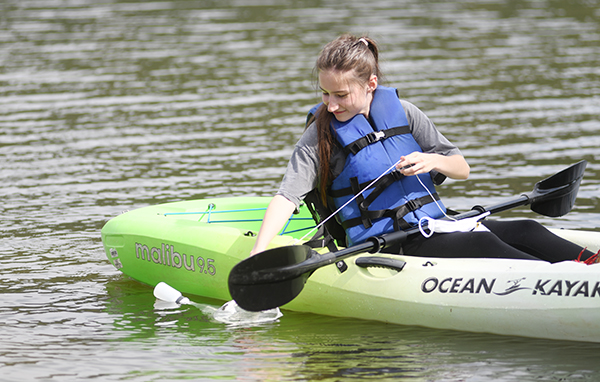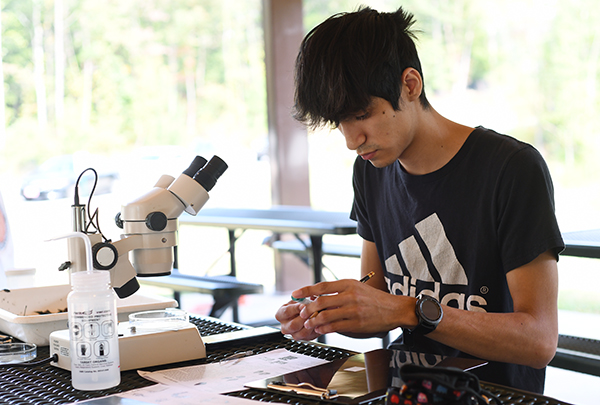News
Haig Mill Lake Provides Hands-on Learning
11/05/20
 Several factors go into determining whether a waterway is clean or not, including which animals are present. Dalton State students in a freshwater ecology class are getting to observe this firsthand at various waterways in Dalton thanks in part to outdoor classrooms at parks operated by Dalton Parks and Recreation.
Several factors go into determining whether a waterway is clean or not, including which animals are present. Dalton State students in a freshwater ecology class are getting to observe this firsthand at various waterways in Dalton thanks in part to outdoor classrooms at parks operated by Dalton Parks and Recreation.
The class collects water and invertebrate samples to measure water quality at Lakeshore Park and Haig Mill Lake, both operated by Dalton Parks and Recreation, as well as from the stream on Dalton State’s campus and a river on private property.
“Any field research is good preparation for life after college,” said Darren Otts, a biology major expecting to graduate in 2023. “This class teaches us those field techniques, how to handle specialized equipment, data reporting and how to handle animals. It’s very helpful to be in this outdoor classroom space because we don’t have to worry about taking samples with us to observe and measure later. We’re able to do it all on site and in a timely manner. If we had to do the lab partially off site we’d miss out on more of the hands-on learning. All the labs are really fun, informative and hands on.”
The freshwater ecology class is new this semester and is taught by Dr. John Lugthart, professor of biology, who specializes in invertebrates. Lugthart and other Dalton State professors have utilized outdoor space at Lakeshore Park, which has a wetland, for years. But Haig Mill Lake is a recent addition.
“Biology classes benefit from having a variety of habitats from which to observe and sample, giving our students hands-on learning experiences,” Lugthart said. “On our campus we have a stream that flows beside our science building and a forested hillside. These two habitats offer excellent, convenient opportunities for labs and student research. But two habitats we don’t have – wetlands and lakes – are available at Lakeshore Park and Haig Mill Lake. Both parks have outdoor classroom pavilions adjacent to the natural areas and provide us with tables, power outlets and water so we can comfortably process samples on-site in various types of weather and use sensitive equipment such as microscopes.”
Haig Mill Lake is larger and deeper than other waterways available to students, providing a different ecosystem. Students utilize kayaks to measure depth, water clarity and dissolved oxygen levels in the middle of the lake. They also sample lake plankton and other invertebrates.
“We’re learning about how professionals measure these qualities in the field,” said Josh Queen, a biology major expecting to graduate in the spring. “We also learn about the difference in tolerant and intolerant animals. If intolerant animals are present, that means it is very clean water. Haig Mill Lake is a very clean waterway. I look forward to seeing what else Dr. Lugthart does with this class. His classes are always fun and interactive, but this one is even more so.”
 Queen isn’t sure what career path he wants to pursue when he graduates but is open to working in an aquarium or a zoo or being a field biologist with a utility company or a parks system.
Queen isn’t sure what career path he wants to pursue when he graduates but is open to working in an aquarium or a zoo or being a field biologist with a utility company or a parks system.
“My future isn’t 100% clear yet, but I know I have options,” he said. “Thanks to this class, I feel like I’ll have even more experience that will help me when I graduate.”
Lugthart designed the class to give students more opportunities.
“One of the great benefits to this kind of class is simply getting outside and learning about our local aquatic habitats and the amazing diversity of organisms that live within them,” he said. “For some students who may decide to pursue a career in natural resources, for example, working with a state or federal agency, this class provides valuable skills and knowledge. Plus, it’s fun and exciting!”
Other classes, such as environmental studies, invertebrate zoology, ornithology and more utilize these outdoor classroom spaces, as have students conducting undergraduate research.
“Dalton Parks and Recreation has been an ideal partner for the college,” Lugthart said. “This partnership creates learning opportunities we would not otherwise have for our students. For nearly 10 years, Dalton State biology majors have been conducting research at Lakeshore Park - measuring nutrient levels, surveying turtles, amphibians, fish, wetland plants, and more. These students have then taken that information and presented their findings at science conferences, some winning prizes for their hard work.”
